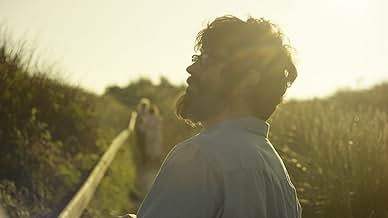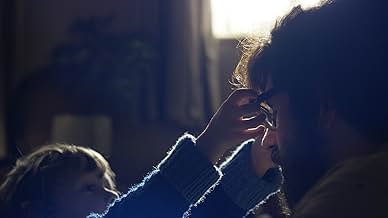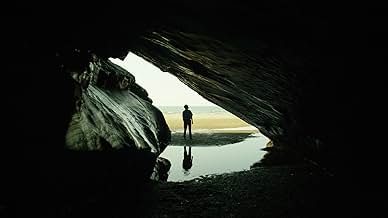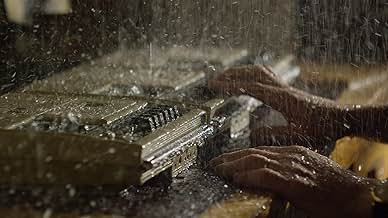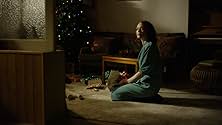Notes on Blindness
- 2016
- 1h 30min
CALIFICACIÓN DE IMDb
7.0/10
2.2 k
TU CALIFICACIÓN
En el verano de 1983, días antes del nacimiento de su hijo, el teólogo John Hull se queda ciego.En el verano de 1983, días antes del nacimiento de su hijo, el teólogo John Hull se queda ciego.En el verano de 1983, días antes del nacimiento de su hijo, el teólogo John Hull se queda ciego.
- Dirección
- Guionistas
- Elenco
- Nominada a3premios BAFTA
- 4 premios ganados y 15 nominaciones en total
John M. Hull
- Self
- (voz)
Marilyn Hull
- Self
- (voz)
Dan Renton Skinner
- John Hull
- (as Dan Skinner)
Sidney Warbrick
- Thomas
- (as Sidney Nicholas Warbrick)
Stanley Warbrick
- Thomas
- (as Stanley John Warbrick)
- Dirección
- Guionistas
- Todo el elenco y el equipo
- Producción, taquilla y más en IMDbPro
Opiniones destacadas
This is a strange and powerful film. It's basically a documentary, with the parts of the people involved portrayed on screen by actors, lip-synching the real life words of the participants. It makes for an other-worldly experience, that's gives a deep insight in to the at once familiar but also utterly alien the main protagonist is forced to inhabit.
The film relates the experiences of John Hull, a writer and theologian who found himself losing his sight just before the birth of his first child. To make sense of his experiences he taped his thoughts - first, reflections on the more practical part of his experiences. As someone who needed to read for his work, for example, he went searching for audiobooks of the academic texts he needed. He discovered that it was assumed that 'blind people don't read big books'; so with an army of friends and families, a library of his books was committed to tape.
As time passes he discovers he needs to understand the condition itself, not just the practicalities of it; he'd found himself so busy preparing for and learning to live with blindness that it prevented him for understanding it. He had to learn to think about his condition: 'If I didn't understand, it would defeat me'.
So begins a series of profound reflections which, as a person who has lived with chronic pain for 20 years, I find very resonant and truthful. The person offering a miracle cure (hypnotherapy) who can't accept John's insistence that his eyes won't just grow back; the people who say he doesn't want his sight back because he seems to have adjusted to it. If we complain about our condition, we're classified as defeatist moaners; if we accept it (as we have to), we've given up (especially as Christians). Onlookers seem only to have categories for the heroic overcomer or pathetic victim; there's no room for someone to keep on, keeping on.
The reflection that 'everyday I wake up, I've lost my sight again'; a painfully truthful expression of the reality that every day I wake up, I'm in pain again.
The reflection on why bad things happen to Christians - 'why shouldn't they happen to me?'; a line I've used myself. This struggle seems to be a bigger one for the people around us, then for the sufferers ourselves. As he says 'I don't regard faith as a shield against the normal ups and downs of life'.
His child screams; they rush to discover it's a finger trapped in a door, but even so he's impotent. "The discovery that you're useless is not a nice discovery for a father to make'; how true. I lie some days in pain, aware of my enforced physical absence from my children and my apparent uselessness as a result.
There are many more moments to reflect on, but the surreal and moving conclusion is the most weighty, as John's dreams are shown melting in to on-screen reality. He ends at a point where blindness (chronic illness) either enables in the sufferer some kind of rebirth, or it destroys you. As he says this, him and his family are soaked in rain, a symbolic baptism and regeneration. It's truthful, healing and challenging all at once.
A unique and wonderful film, to be lived with and drunk deep from - especially for chronic illness sufferers and those who travel with them.
The film relates the experiences of John Hull, a writer and theologian who found himself losing his sight just before the birth of his first child. To make sense of his experiences he taped his thoughts - first, reflections on the more practical part of his experiences. As someone who needed to read for his work, for example, he went searching for audiobooks of the academic texts he needed. He discovered that it was assumed that 'blind people don't read big books'; so with an army of friends and families, a library of his books was committed to tape.
As time passes he discovers he needs to understand the condition itself, not just the practicalities of it; he'd found himself so busy preparing for and learning to live with blindness that it prevented him for understanding it. He had to learn to think about his condition: 'If I didn't understand, it would defeat me'.
So begins a series of profound reflections which, as a person who has lived with chronic pain for 20 years, I find very resonant and truthful. The person offering a miracle cure (hypnotherapy) who can't accept John's insistence that his eyes won't just grow back; the people who say he doesn't want his sight back because he seems to have adjusted to it. If we complain about our condition, we're classified as defeatist moaners; if we accept it (as we have to), we've given up (especially as Christians). Onlookers seem only to have categories for the heroic overcomer or pathetic victim; there's no room for someone to keep on, keeping on.
The reflection that 'everyday I wake up, I've lost my sight again'; a painfully truthful expression of the reality that every day I wake up, I'm in pain again.
The reflection on why bad things happen to Christians - 'why shouldn't they happen to me?'; a line I've used myself. This struggle seems to be a bigger one for the people around us, then for the sufferers ourselves. As he says 'I don't regard faith as a shield against the normal ups and downs of life'.
His child screams; they rush to discover it's a finger trapped in a door, but even so he's impotent. "The discovery that you're useless is not a nice discovery for a father to make'; how true. I lie some days in pain, aware of my enforced physical absence from my children and my apparent uselessness as a result.
There are many more moments to reflect on, but the surreal and moving conclusion is the most weighty, as John's dreams are shown melting in to on-screen reality. He ends at a point where blindness (chronic illness) either enables in the sufferer some kind of rebirth, or it destroys you. As he says this, him and his family are soaked in rain, a symbolic baptism and regeneration. It's truthful, healing and challenging all at once.
A unique and wonderful film, to be lived with and drunk deep from - especially for chronic illness sufferers and those who travel with them.
Notes on Blindness is an insight into the life of John Hull, an academic who, as he descended into the darkness of total blindness, began to record his thoughts and feelings on the process. These very recordings are lip-synced by the actors and they, along with a unique visual style, attempt to recreate John's perspective on his experience. Obviously this is not a slapstick comedy but the end-product is moving and it's taught me a lot about blindness that I'd never considered. He has a slightly different take on going blind to some others so it's always going to be a personal and subjective viewpoint. Magnificent bit of film-making and the thought that this is the Director's first feature is hard to credit. Give it a best documentary Oscar now.
I love the concept behind these. Using actual tapes, editing them together in a way to present them as a narrative, and then creating the visuals to match it. The fact that it is a story about a man who no longer can see, adds to it. It's an interesting way to mix truth and fiction, because the story and dialogue is all real, and could have been presented as a documentary of sorts. But by editing them, adding the environmental sounds, and getting actors to "play it out", it blurs the line in a really interesting way. That, in addition to some of the insights into how it is to become blind, are the clear highlights of the movie. Sadly, it does not have much more to offer that's very interesting.
In a way, ironically, I think this story would work better as just the audio. The editing done was brilliant, and combine with the atmospheric sounds added, I think it could have been a really good radio story. With an added level that a story about blindness would have no visuals.
In a way, ironically, I think this story would work better as just the audio. The editing done was brilliant, and combine with the atmospheric sounds added, I think it could have been a really good radio story. With an added level that a story about blindness would have no visuals.
I usually don't go in to a film totally blind (no pun intended), so I knew it was about a theologian who slowly goes blind and decides to keep recordings of his blindness. Interesting enough. Somehow I delayed watching it until now. I am here to tell you it is a truly rewarding experience. Don't let the title put you off. Slowly and surely you'll be immersed in John Hull's baritone voice with his succinct observations on life. And you will applaud his caring family who are always by his side. Rain drops have taken on a whole new meaning for me now.
This is such an amazing piece of work; put in the shoes of someone who loses his sight, halfway through his lifetime, which is one of my personal worst nightmares, I was in tears throughout most of this film. Sight is so essential to my every being, I cannot describe how awful it felt to me, to put myself in the shoes of someone losing perhaps the most important sense of all. It was absolutely devastating to be brought along this journey into nothingness with this film. And yet, as John puts it, it's still a gift bestowed upon him, just like this film is. The whole is so beautifully, atmospherically put together. The cinematography matches the subject so incredibly well, it works with how you could possibly show a person's story who can't see. For a person to overcome this disability, to make the most of it, to thrive on it, despite relying on all senses but his sight, is so amazingly inspirational.
I found myself challenging myself to experience my senses, other than my sight more fully. I walked around my house with my eyes shut, I stood outside listening to the rain falling, I familiarised myself to my surroundings.
No film to date has ever had this effect on me.
¿Sabías que…?
- TriviaWhen it was shown on British TV, the film was made available with two soundtracks. The first was a "heightened soundtrack" produced by one of Europe's leading sound designers, Joakim Sundström, who created a rich, immersive soundtrack calibrated specifically for blind audiences, using enhanced sound design and additional audio from the characters to guide the audience through the story. The second was a more regular audio described version read by Stephen Mangan.
- Citas
John M. Hull: What I remember about you most vividly in those years was your amazing practicality. You never expressed regrets. You just got on with the next thing, step by step. The way you did that, I always thought was incredible.
- ConexionesRemake of Notes on Blindness (2014)
Selecciones populares
Inicia sesión para calificar y agrega a la lista de videos para obtener recomendaciones personalizadas
- How long is Notes on Blindness?Con tecnología de Alexa
Detalles
Taquilla
- Total a nivel mundial
- USD 104,214
- Tiempo de ejecución1 hora 30 minutos
- Color
- Mezcla de sonido
- Relación de aspecto
- 2.35 : 1
Contribuir a esta página
Sugiere una edición o agrega el contenido que falta



